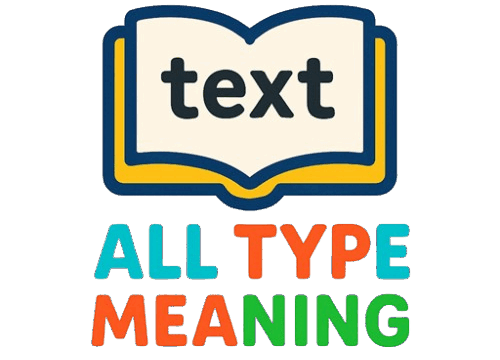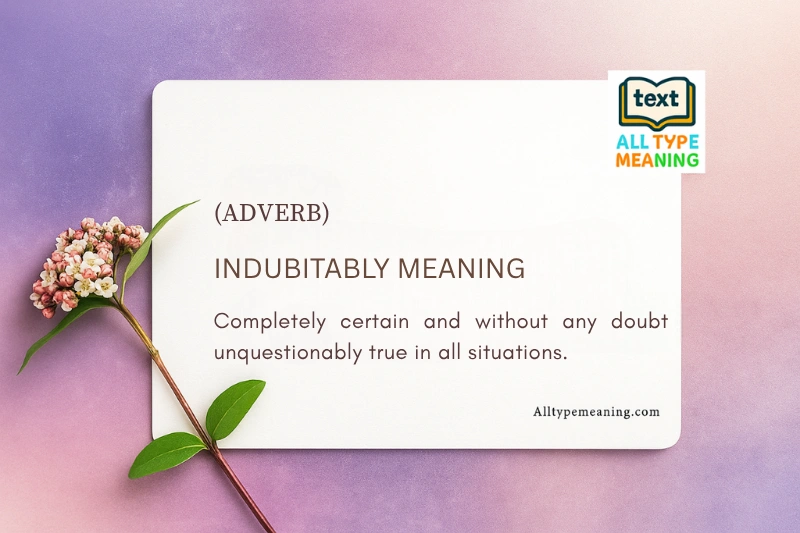Welcome to All Type meaning! Certainly, the Indubitably meaning may seem like a sophisticated or antiquated word, but it serves as a strong way to convey complete certainty. In simple terms, “indubitably” signifies without any doubt or certainly true. You will frequently encounter it in formal discussions, literature, or even clever exchanges to highlight assurance.
Mastering this word can improve your vocabulary, assist students in writing more accurately, and enable professionals or language learners to appear more eloquent. In this blog, we will delve into the comprehensive meaning, origin, and practical instances of how to use “indubitably” naturally in daily conversation.
Quick Stats Table
| Aspect | Details |
|---|---|
| Word | Indubitably |
| Part of Speech | Adverb |
| Syllables | 5 (in-du-bi-ta-bly) |
| Origin | Latin (indubitabilis) |
| First Known Use | 1530s |
| Formality Level | Formal/Sophisticated |
| Frequency | Moderate (More in written than spoken) |
| Difficulty Level | Advanced |
What Does “Indubitably” Mean?
Indubitably Definition:
Adverb – In a manner that is impossible to doubt; unquestionably; certainly; without a doubt.
When you say something is “indubitably” true, you’re expressing absolute certainty and leaving no room for doubt or questioning. It’s a powerful word that emphasizes complete conviction in a statement.
Simple Definition for Everyone: If something is indubitably true, it means you are 100% sure about it—there’s no way it could be false!
Meaning in Different Languages
| Language | Translation | Example |
|---|---|---|
| Spanish | Indudablemente | Indudablemente, es la mejor opción. |
| French | Indubitablement | C’est indubitablement vrai. |
| German | Zweifellos | Das ist zweifellos richtig. |
| Italian | Indubbiamente | È indubbiamente corretto. |
| Portuguese | Indubitavelmente | Indubitavelmente, ele está certo. |
| Hindi | निस्संदेह (Nishsandeh) | यह निस्संदेह सच है। |
| Arabic | بلا شك (Bila shakk) | هذا صحيح بلا شك. |
| Chinese | 毫无疑问 (Háo wú yíwèn) | 这毫无疑问是真的。 |
Pronunciation Guide
Phonetic Spelling: in-DOO-bit-uh-blee
IPA (International Phonetic Alphabet): /ɪnˈdjuː.bɪ.tə.bli/ (British) or /ɪnˈduː.bɪ.t̬ə.bli/ (American)
Breaking It Down:
- in – like “in” (short i sound)
- du – like “doo” (long u sound)
- bi – like “bit” (short i sound)
- ta – like “tuh” (schwa sound)
- bly – like “blee” (long e sound)
Pro Tip: The stress falls on the second syllable: in-DU-bi-ta-bly
Origin & Etymology
The word “indubitably” has a rich historical background that traces back to Latin:
Latin Root: indubitabilis
- in- = not
- dubitare = to doubt
- -abilis = able to be
Evolution Timeline:
- 16th Century (1530s): First appeared in English from Middle French “indubitablement”
- Latin Foundation: Derived from “indubitabilis” meaning “not doubtful”
- Modern Usage: Gained popularity in formal English and literary works
The word essentially means “not-doubtable” or “unable to be doubted,” which perfectly captures its meaning of absolute certainty. Throughout history, it has been favored by writers, scholars, and speakers who wanted to express unwavering conviction.
Detailed Usage & Context
Understanding Indubitably meaning and how to use it correctly is essential for mastering this elegant word. It’s an adverb that expresses complete certainty or strong agreement, often used in formal or sophisticated communication.
Primary Uses:
- Expressing Strong Agreement: When you want to emphatically agree with someone’s statement
- Example: “Is climate change real?” “Indubitably!”
- Confirming Facts: To emphasize that something is undeniably true
- Example: She is indubitably the best candidate for the position.
- Formal Writing: Academic papers, professional documents, and literary works
- Example: The research indubitably proves the hypothesis.
- Adding Sophistication: To elevate the tone of speech or writing
- Example: This is indubitably the finest wine I’ve tasted.
Grammar Notes:
✅ Sentence Position: Typically appears at the beginning or middle of sentences ✅ Modifies: Verbs, adjectives, or entire clauses ✅ Formality: Considered formal; casual alternatives include “definitely” or “certainly” ✅ Collocations: Often paired with “is,” “was,” “proves,” “demonstrates”
Common Contexts:
- Academic and scientific writing
- Legal documents
- Historical texts
- Formal speeches
- Classic literature
- British English (more common than American English)
Synonyms & Antonyms Table
Synonyms
| Synonym | Meaning |
|---|---|
| Undoubtedly | Without any doubt; certainly |
| Unquestionably | Beyond question; indisputably |
| Certainly | Without doubt; definitely |
| Definitely | Clearly; without question |
| Surely | With certainty; undoubtedly |
| Absolutely | Completely; totally certain |
| Undeniably | Cannot be denied or disputed |
| Incontestably | In a way that cannot be disputed |
| Irrefutably | In a way that cannot be disproved |
| Unequivocally | In a way that is clear and unambiguous |
Antonyms
| Antonym | Meaning |
|---|---|
| Doubtfully | With uncertainty or hesitation |
| Questionably | In a way that raises doubts |
| Uncertainly | Without being sure; hesitantly |
| Perhaps | Possibly; maybe |
| Maybe | Possibly but not certainly |
| Arguably | It can be argued; debatable |
| Dubiously | With doubt or suspicion |
| Possibly | Perhaps; capable of happening |
| Allegedly | Claimed but not proven |
| Supposedly | According to what is generally believed |
Words That Look Similar
Be careful! These words look like “indubitably” but have different meanings:
- Dubitably (rare) – In a doubtful manner
- Indubitable (adjective) – Impossible to doubt; unquestionable
- Inevitably – Certain to happen; unavoidable
- Incredibly – To an extraordinary degree; unbelievably
- Indelibly – In a way that cannot be removed or forgotten
Note: “Indubitable” is the adjective form, while “indubitably” is the adverb form!
Example Sentences
Here are 7 practical examples showing different contexts:
- Formal Agreement: “The professor’s research findings are indubitably accurate and well-documented.”
- Historical Context: “Shakespeare was indubitably one of the greatest playwrights in English literature.”
- Scientific Statement: “The experiment indubitably demonstrates the relationship between temperature and pressure.”
- Conversational (Formal): “Would you like to join us for dinner?” “Indubitably! I’d be delighted.”
- Legal Context: “The evidence indubitably proves the defendant’s innocence in this case.”
- Opinion Expression: “This is indubitably the most challenging project we’ve undertaken this year.”
- Literary Style: “The sunset over the mountains was indubitably the most beautiful sight I had ever witnessed.”
Common Mistakes & Tips
Spelling Errors to Avoid:
❌ indubitibly ❌ indubitably (missing ‘a’) ❌ indubitabely ✅ indubitably (correct)
Usage Mistakes:
❌ Wrong: “I indubitably went to the store yesterday.”
- Why it’s wrong: Too formal for simple past actions
✅ Better: “I went to the store yesterday.”
❌ Wrong: “That’s indubitably cool, bro!”
- Why it’s wrong: Formal word in casual context creates awkwardness
✅ Better: “That’s definitely cool!” or “That’s totally awesome!”
Tips for Proper Use:
✨ Use in formal writing, presentations, and professional settings ✨ Avoid in casual conversations unless being intentionally formal/humorous ✨ Don’t overuse—it can sound pretentious ✨ Match the formality level of your overall communication
Cultural & Contextual Insights
Literary Significance: “Indubitably” has been a favorite of classic authors including:
- Charles Dickens
- Arthur Conan Doyle (Sherlock Holmes stories)
- Jane Austen
- Victorian-era writers
Modern Pop Culture: The word has gained internet fame through:
- Memes: Often used humorously with images of sophisticated characters
- Sherlock Holmes references: Associated with British detective stories
- Sarcastic usage: Young people use it ironically to sound overly formal
Regional Differences:
- More common in British English than American English
- Often associated with upper-class British speech
- In American English, “definitely” or “absolutely” are more common
Tips to Remember & Learn
Memory Tricks:
- Break It Down: Think “in-doubt-able-ly” = NOT able to be doubted
- Visual Association: Picture a judge’s gavel—when they decide, it’s indubitable!
- Rhyme Helper: “Indubitably means undoubtably, with certainty and reliability!”
- Practice Sentence: “It is indubitably true that practice makes perfect!”
Learning Strategy: 📌 Read it in context (classic literature) 📌 Write 3 sentences using the word daily 📌 Find synonyms and understand subtle differences 📌 Listen to British English speakers or period dramas
Related Words & Word Family
Adjective Form:
- Indubitable – impossible to doubt; unquestionable
- Example: His talent is indubitable.
Noun Form:
- Indubitability – the quality of being indubitable
- Example: The indubitability of the evidence convinced everyone.
Root Word:
- Doubt – a feeling of uncertainty
- Dubious – hesitating or doubting
Related Words:
- Undoubted (adjective)
- Doubtless (adverb)
- Unquestionable (adjective)
- Certain (adjective)
Reader Interaction
Now that you’ve learned about “indubitably meaning” try using it in your next formal essay or presentation!
Challenge: Can you create a sentence using “indubitably” in the comments? Share your example, and let’s learn together!
Share this article with students and word lovers who want to expand their vocabulary. Bookmark AllTypeMeaning.com for more word guides like this! 🔖
Related Expressions & Modern Usage
Classic Expressions:
- “Indubitably so!” – Emphatic agreement
- “It is indubitably true that…” – Formal statement opener
- “Most indubitably” – Extra emphasis
Slang & Internet Evolution: While not slang itself, “indubitably” has evolved into:
- Meme culture: Used ironically with monocle/top hat images
- Sarcastic agreement: “Oh, indubitably!” (said with exaggerated tone)
- Nerdy humor: Associated with intellectual or Victorian-era cosplay
Modern Alternatives: If “indubitably” feels too formal, try:
- Definitely ✨
- Absolutely 💯
- For sure 👍
- Without a doubt ✓
- 100% 🎯
Conclusion:
Frequently Asked Questions
1. Is “indubitably” a formal or informal word?
Answer: “Indubitably” is a formal word. It’s best used in academic writing, professional settings, formal speeches, or literary contexts. In casual conversation, words like “definitely” or “absolutely” are more appropriate. Using “indubitably” in everyday chat might sound overly sophisticated or even humorous!
2. What’s the difference between “indubitably” and “undoubtedly”?
Answer: Both words mean “without doubt,” but there’s a subtle difference. “Undoubtedly” is more common and slightly less formal, making it suitable for both formal and semi-formal contexts. “Indubitably” is more emphatic and formal, often used to add extra sophistication. Think of “indubitably” as the “fancier cousin” of “undoubtedly”!
3. How do you pronounce “indubitably” correctly?
Answer: Pronounce it as in-DOO-bit-uh-blee (or in-DU-bit-uh-blee). The stress is on the second syllable “DU.” Break it into five syllables: in-du-bi-ta-bly. Practice saying it slowly, then speed up. Listen to pronunciation guides online or in dictionary apps for audio examples!
4. Can I use “indubitably” in everyday conversation?
Answer: While you can use it, it’s not recommended for casual, everyday conversation as it may sound pretentious or out of place. However, you can use it humorously or ironically with friends, or in situations where you want to sound intentionally formal or sophisticated. Save it for formal writing, presentations, or when you want to add a touch of elegance!
5. What are the best synonyms for “indubitably” that I can use?
Answer: Great synonyms include: undoubtedly, unquestionably, certainly, definitely, surely, absolutely, undeniably, and without doubt. For formal writing, use “unquestionably” or “undeniably.” For everyday use, “definitely” or “certainly” work perfectly. Choose based on your context and desired formality level!

